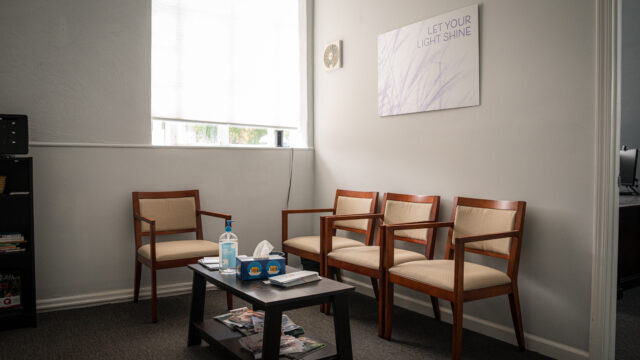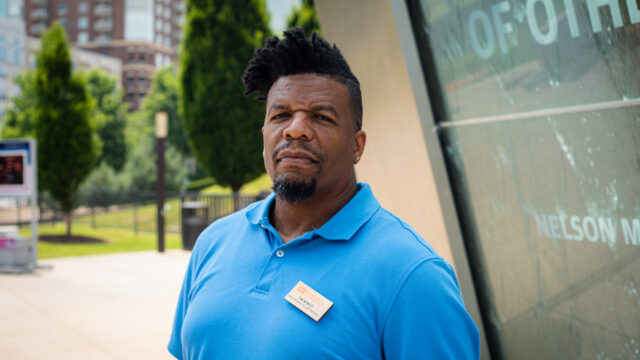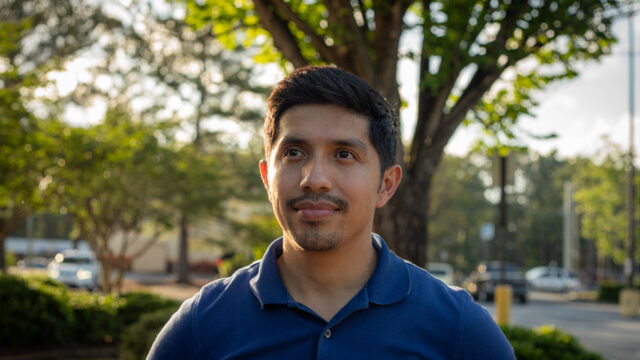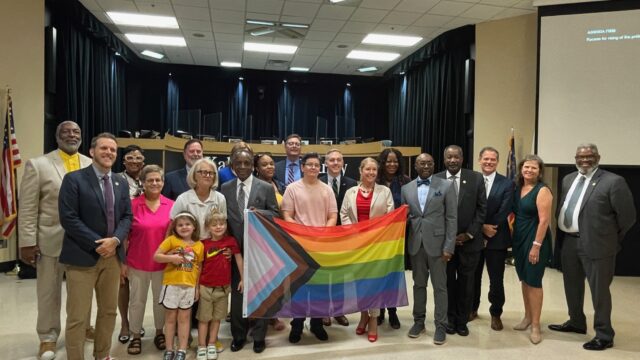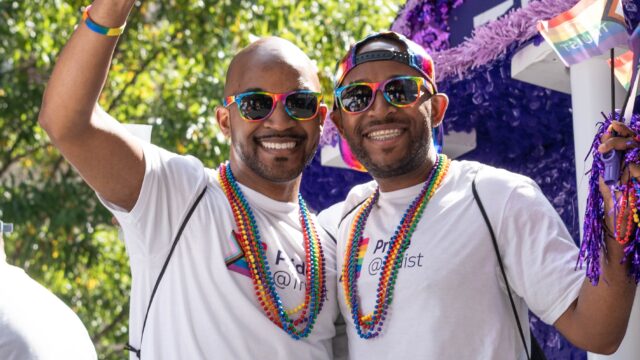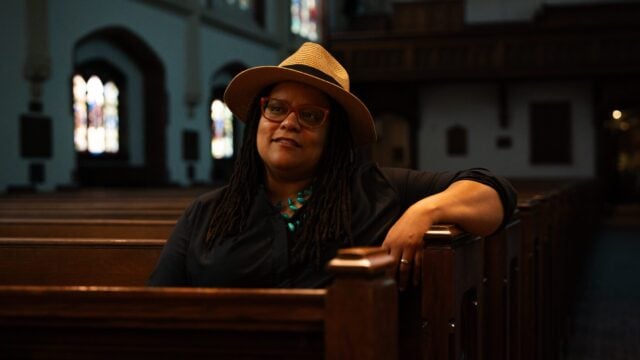Four years after making history by being elected as Georgia’s first openly gay senator, Kim Jackson is continuing the work of advocating for the LGBTQ community.
As both a legislator and an ordained Episcopal priest — another rarity among state lawmakers — Jackson has a goal of making life better for people for whom life has been hard.
“The only job that I’ve had as a professional, as an adult, has been one of being a priest and pastor,” Jackson says. “I care for people. That’s what I do.”
Her first two terms in the Senate were marked by a surge in legislation that could hurt the LGBTQ community. And while she’s in a unique position to help lawmakers understand how such legislation impacts people, the pressure of representing the community has fallen on her shoulders.
“I do feel like it’s been an honor and a gift to be that voice for people,” Jackson says. “And I hope … that it’s made the way for young queer kids a little easier.”
“But it’s just hard.”

The power of relationships
It’s been a long road to welcoming someone like Jackson to the Senate.
In 2004, Georgia voters approved a ballot referendum that amended the state Constitution to say that marriage can only be between a man and a woman. (That referendum became unconstitutional in 2015 when the U.S. Supreme Court legalized same-sex marriage.)
In 2018, the Georgia Senate passed a bill that would’ve allowed faith-based adoption agencies to decline placing a child with a same-sex couple. The law (which failed to pass in the House and become law) would have impacted families similar to Jackson’s — she and her wife have legal guardianship of two children.
“And yet here we are, 10 years later, 15 years later, and [they] have embraced me and my family with love,” she says. “That’s the power of relationships, right?”
She remembers being received well by her colleagues when she joined the Senate in 2021 and formed positive relationships with them — even those that she says likely supported past measures that would negatively impact her life.
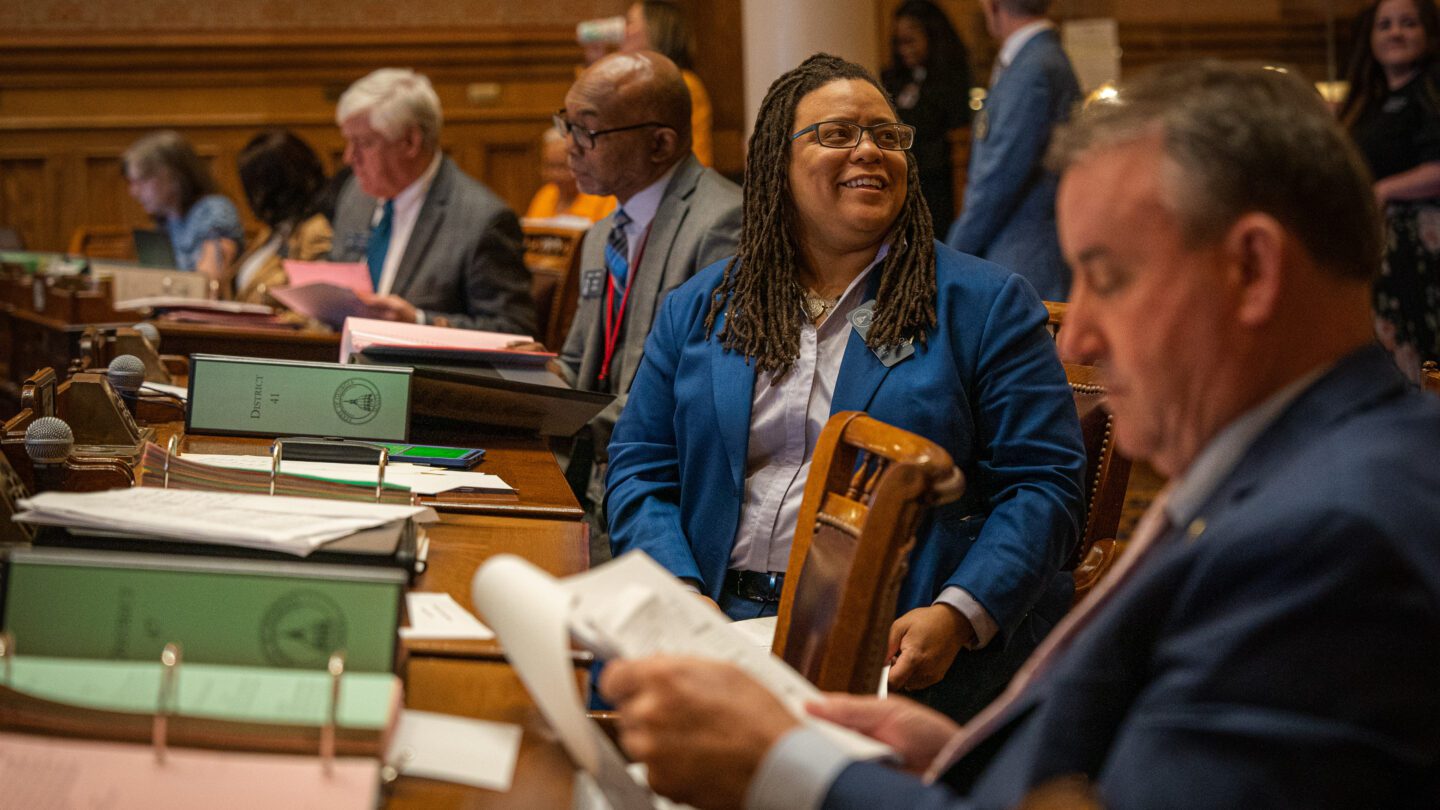
But the support of her colleagues doesn’t always translate into them voting in line with her interests. She has repeatedly watched the people she’s grown close with vote against her interests.
She describes it as hitting a brick wall with them.
“My colleagues who literally sit next to me and see pictures of my kids and we share stories with each other … look me in the face and vote against my community. And that’s hard,” Jackson says.
A focal point of bills impacting the LGBTQ community are those regarding transgender kids. Jackson calls them a “particularly vulnerable portion” of the community.
In 2023, the legislature passed a bill banning hormone therapy and gender-affirming surgery for minors. In 2024, more restrictions on transgender healthcare for minors were pushed this time — a proposal to ban puberty blockers. It passed in the Senate but died in the House. Votes for both bills went along party lines.
Jackson says that her Republican colleagues — though misguided — aren’t malicious in supporting the bills, but just trying to protect children.
“And so when they are thinking about protecting their children, when they’re thinking about bills and legislation for their children, they’re thinking about who they assume are heterosexual, heteronormative cisgender children,” Jackson says. “Now, the reality is some of their children will end up being trans as well. The reality is some of their children are queer.”
A team of WABE reporters take a deeper look at the issues affecting LGBTQ people in Georgia. Plus, LGBTQ Atlantans in their own words, Pride events calendar, LGBTQ coverage from other NPR stations across the South and more.
Speaking out against bills
Outside of the legislature, Jackson leads the Church of the Common Ground, a church that serves Atlanta’s unhoused population. Shereetha Jackson is the chief operating officer of Common Ground.
“I can’t view one without the other,” she said about Kim Jackson’s roles as a priest and a lawmaker. “So that’s why the good reverend senator works the way that she does because she sees the connection of the two.”
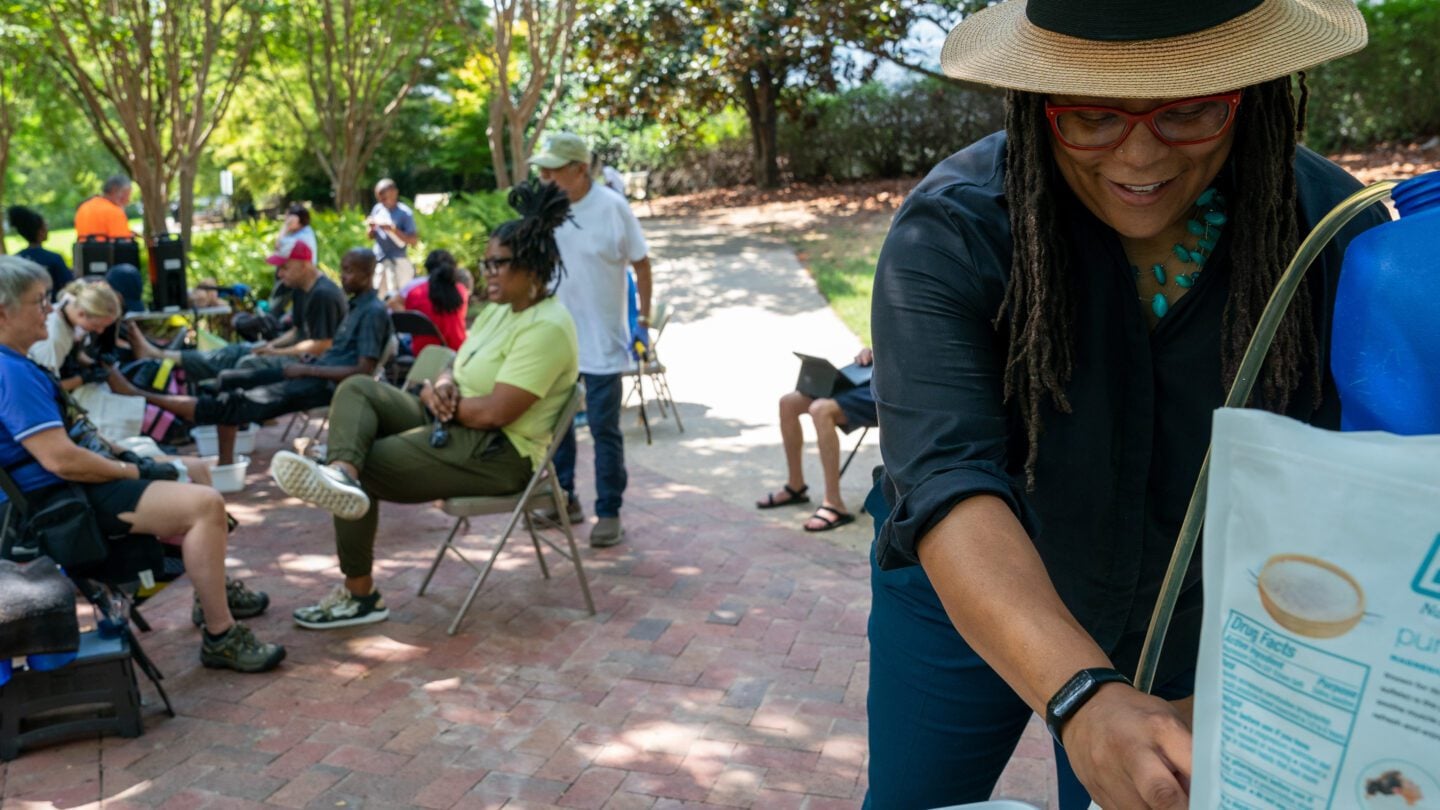
So this year, Jackson’s opposition to a bill allegedly strengthening religious freedoms was notable.
The bill, called the Religious Freedom Restoration Act (RFRA), would limit the government’s ability to pass laws that conflict with religious beliefs. It’s been criticized as an anti-LGBTQ bill that could allow discrimination under the protection of religious liberty.
Georgia is one of three states without a comprehensive non-discrimination law. Under RFRA, critics argue that individuals statewide would have a legal basis for discriminating against anyone — even in cities with their own non-discrimination ordinances, like Atlanta and several others in the metro area.
Republicans have attempted to pass RFRA in Georgia for over a decade. Jackson remembers being at the Capitol fighting against the bill as a clergy member before she was elected.
She calls it a “full circle moment” to have to speak out against it again — this time, in the Senate well to her colleagues.
“I think that there’s just a different power that comes from being able to speak from that place of like, ‘I know what it is to be marginalized … I know what the implications of this can be,’” Jackson says.
But Jackson says it’s exhausting for her to be the only member of the LGBTQ community in the Senate pushing back against legislation like RFRA.
“Feeling the obligation to always have to go to the well and to speak against these bills, because I know that our community is looking for someone to be that voice, has felt really weighty and at times has left me in tears in my office wondering, ‘Can I do this? Am I doing this well enough?’” she says.
Fighting for the community together
Next year Jackson will be joined in the Senate by Rashaun Kemp, the state’s first openly gale male senator. Kemp won the Democratic primary for District 38 in Fulton County and doesn’t have a Republican challenger.
“It’s really alarming and concerning,” Kemp said about anti-LGBTQ rhetoric and legislation. “But I think that ultimately it’s about people getting to see the faces of the people that they’re impacting.”
“And the fact that there’s never been a gay male in our state Senate hopefully will help to change some hearts and minds,” he says.
His priorities for the upcoming session are improving access to healthcare and investing in education. But he also looks forward to joining Jackson and fighting for the community together.
“I learned from her, I’m going to be doing a lot of soaking in as well. But [I] also recognize [that] having somebody else alongside you that understands this community is critically important.”
There are also five LGBTQ lawmakers currently in the Georgia House of Representatives. Two face Republican opposition in the general election in November.
Finding common ground
Jackson is up for re-election this year and her opponent is Republican Jeff Newlin, a political newcomer who works in the software and technology industry. Senate District 41 recently underwent significant redistricting but is expected to remain blue this year.
“Historically, it’s been very Democrat, which is fine … I think there’s a lot more common ground that we have in what we want to accomplish,” Newlin says.
If elected, he wants to prioritize school choice, creating more jobs in the construction industry and defending the Second Amendment.
Regarding the LGBTQ community, Newlin says he recognizes peoples’ individual rights to live how they choose, and he says that hatred and bigotry have no place in the discourse. But he supports protecting parents’ rights to decide what should and shouldn’t be taught to their children regarding gender and sexuality.
“I think both sides need to be respectful of where that intersects with how individuals want to raise their children and what they want to work within the public sector,” he says.
According to the Human Rights Campaign, over 20 bills that could negatively impact LGBTQ people were introduced in Georgia this year — a historic number.
“I tell people all the time, the fact that you’re seeing more attacks on LGBTQ folks … it’s actually a sign of progress,” she says. “It means that we’ve been winning, we’ve been doing the work of getting LGBTQ representation in children’s books in schools. That’s why they want to ban them.”
This story is part of the ongoing series Beyond Pride, in which WABE reporters take a deeper look at the issues affecting LGBTQ people in Georgia. Plus, hear LGBTQ Atlantans in their own words, check out a Pride events calendar running through the fall, LGBTQ coverage from other NPR stations across the South and more.











